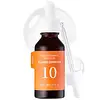What's inside
What's inside
 Key Ingredients
Key Ingredients

No key ingredients
 Benefits
Benefits

 Concerns
Concerns

 Ingredients Side-by-side
Ingredients Side-by-side

Water
Skin ConditioningMethylpropanediol
SolventButylene Glycol
Humectant1,2-Hexanediol
Skin ConditioningC13-15 Alkane
SolventHouttuynia Cordata Extract
Skin ConditioningAmmonium Acryloyldimethyltaurate/Vp Copolymer
Propylene Glycol
HumectantCarbomer
Emulsion StabilisingPolyglyceryl-10 Laurate
Skin ConditioningXanthan Gum
EmulsifyingTromethamine
BufferingSodium Phytate
Dipropylene Glycol
HumectantPolyglyceryl-10 Oleate
Skin ConditioningSchisandra Chinensis Fruit Extract
Skin ConditioningPyrus Communis Fruit
AstringentMelia Azadirachta Extract
Skin ConditioningEclipta Prostrata Extract
Skin ConditioningRosa Damascena Flower Water
MaskingIris Florentina Root Extract
MaskingCucumis Melo Fruit Extract
Skin ConditioningMelia Azadirachta Flower Extract
Skin ConditioningHedera Helix Leaf/Stem Extract
AntimicrobialMelaleuca Alternifolia Leaf Extract
PerfumingOcimum Basilicum Oil
MaskingRosa Damascena Flower Oil
MaskingCitric Acid
BufferingSalix Alba Bark Extract
AstringentSalicylic Acid
MaskingWater, Methylpropanediol, Butylene Glycol, 1,2-Hexanediol, C13-15 Alkane, Houttuynia Cordata Extract, Ammonium Acryloyldimethyltaurate/Vp Copolymer, Propylene Glycol, Carbomer, Polyglyceryl-10 Laurate, Xanthan Gum, Tromethamine, Sodium Phytate, Dipropylene Glycol, Polyglyceryl-10 Oleate, Schisandra Chinensis Fruit Extract, Pyrus Communis Fruit, Melia Azadirachta Extract, Eclipta Prostrata Extract, Rosa Damascena Flower Water, Iris Florentina Root Extract, Cucumis Melo Fruit Extract, Melia Azadirachta Flower Extract, Hedera Helix Leaf/Stem Extract, Melaleuca Alternifolia Leaf Extract, Ocimum Basilicum Oil, Rosa Damascena Flower Oil, Citric Acid, Salix Alba Bark Extract, Salicylic Acid
Water
Skin ConditioningButylene Glycol
HumectantBetaine
HumectantNiacinamide
Smoothing1,2-Hexanediol
Skin ConditioningPolyglyceryl-4 Caprate
EmulsifyingMethyl Gluceth-20
HumectantLactobacillus/Lac Ferment
Skin ConditioningHydroxyethyl Acrylate/Sodium Acryloyldimethyl Taurate Copolymer
Emulsion StabilisingSqualane
EmollientCarbomer
Emulsion StabilisingDimethicone
EmollientTromethamine
BufferingAdenosine
Skin ConditioningSodium Hyaluronate
HumectantDipropylene Glycol
HumectantSodium Phytate
Xanthan Gum
EmulsifyingPogostemon Cablin Leaf Oil
MaskingCitrus Nobilis Peel Oil
MaskingCitrus Aurantium Dulcis Peel Oil
MaskingWater, Butylene Glycol, Betaine, Niacinamide, 1,2-Hexanediol, Polyglyceryl-4 Caprate, Methyl Gluceth-20, Lactobacillus/Lac Ferment, Hydroxyethyl Acrylate/Sodium Acryloyldimethyl Taurate Copolymer, Squalane, Carbomer, Dimethicone, Tromethamine, Adenosine, Sodium Hyaluronate, Dipropylene Glycol, Sodium Phytate, Xanthan Gum, Pogostemon Cablin Leaf Oil, Citrus Nobilis Peel Oil, Citrus Aurantium Dulcis Peel Oil
 Reviews
Reviews

Ingredients Explained
These ingredients are found in both products.
Ingredients higher up in an ingredient list are typically present in a larger amount.
1,2-Hexanediol is a synthetic liquid and another multi-functional powerhouse.
It is a:
- Humectant, drawing moisture into the skin
- Emollient, helping to soften skin
- Solvent, dispersing and stabilizing formulas
- Preservative booster, enhancing the antimicrobial activity of other preservatives
Butylene Glycol (or BG) is used within cosmetic products for a few different reasons:
Overall, Butylene Glycol is a safe and well-rounded ingredient that works well with other ingredients.
Though this ingredient works well with most skin types, some people with sensitive skin may experience a reaction such as allergic rashes, closed comedones, or itchiness.
Learn more about Butylene GlycolCarbomer is a polymer of acrylic acid. Its main role is to create a gel consistency.
A high amount of carbomer can cause pilling or balling up of products. Don't worry, most products contain 1% or less of carbomer.
Dipropylene Glycol is a synthetically created humectant, stabilizer, and solvent.
This ingredient helps:
Dipropylene glycol is technically an alcohol, but it belongs to the glycol family (often considered part of the ‘good’ alcohols). This means it is hydrating and gentle on skin unlike drying solvent alcohols like denatured alcohol.
As a masking agent, Dipropylene Glycol can be used to cover the smell of other ingredients. However, it does not have a scent.
Studies show Dipropylene Glycol is considered safe to use in skincare.
Learn more about Dipropylene GlycolSodium Phytate is the synthetic salt form of phytic acid. Phytic acid is an antioxidant and can be found in plant seeds.
Sodium Phytate is a chelating agent. Chelating agents help prevent metals from binding to water. This helps stabilize the ingredients and the product.
Tromethamine helps balance the pH and improve the texture of a product. It is synthetically created.
As an emulsifier, Tromethamine prevents oil and water ingredients from separating. This helps stabilize the product and elongate a product's shelf life. Tromethamine also makes a product thicker.
Tromethamine helps balance the pH level of a product. Normal pH level of skin is slightly acidic (~4.75-5.5). The acidity of our skin is maintained by our glands and skin biome. Being slightly acidic allows our skin to create an "acid mantle". This acid mantle is a thin barrier that protects our skin from bacteria and contaminants.
Oral Tromethanmine is an anti-inflammatory drug but plays the role of masking, adding fragrance, and/or balancing pH in skincare.
1,3-Propanediol, 2-amino-2-(hydroxymethyl)-
Learn more about TromethamineWater. It's the most common cosmetic ingredient of all. You'll usually see it at the top of ingredient lists, meaning that it makes up the largest part of the product.
So why is it so popular? Water most often acts as a solvent - this means that it helps dissolve other ingredients into the formulation.
You'll also recognize water as that liquid we all need to stay alive. If you see this, drink a glass of water. Stay hydrated!
Learn more about WaterXanthan gum is used as a stabilizer and thickener within cosmetic products. It helps give products a sticky, thick feeling - preventing them from being too runny.
On the technical side of things, xanthan gum is a polysaccharide - a combination consisting of multiple sugar molecules bonded together.
Xanthan gum is a pretty common and great ingredient. It is a natural, non-toxic, non-irritating ingredient that is also commonly used in food products.
Learn more about Xanthan Gum